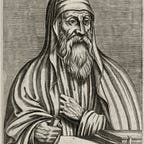The Religion of Reductionism
How the gifts of modern scientism lean on incompatible beliefs, and the way to truth
Stephen Hawking’s last book ‘The Grand Design’ opened with the words “philosophy is dead”. For him, modern philosophy had simply failed to keep up with the advances in science, and so fallen behind. The torch to bear came only from physicists, who would surely one day reach the shores of the promised land, the theory of everything.
The genius of generations of scientists and thinkers is however based on assumptions that they choose to ignore. This is not to say they are wrong in the actual field of their work, they are not, or if they are I’m not qualified to say so, and so much of our knowledge and technological ability stems from their brilliance. But the freedom of their work is dependant on a set of beliefs about what they are doing that are contradictory and irrational. Like early modern scientists whose scientific work was contextualised by belief in a divine creator, many scientists of the modern era depend on beliefs that have no philosophical ground.
One of these is the assumption of reductionism. That is, a theory of everything is dependant on the idea that “everything” is itself explicable by the small, rather than the whole. The idea behind science, a necessary tool of precision, is that to…
